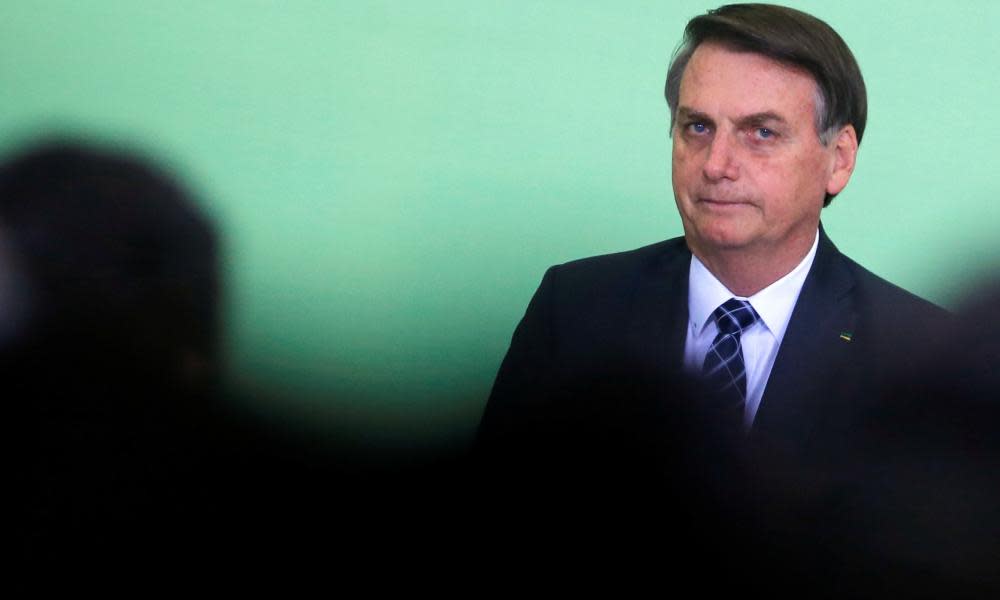Indict Jair Bolsonaro over indigenous rights, international court is urged

Brazilian lawyers and an influential human rights group including six former government ministers are seeking to indict the far-right president Jair Bolsonaro at the International Criminal Court for encouraging genocide against Brazil’s indigenous people.
Brazil’s Human Rights Advocacy Collective (CADHu) and the Dom Paulo Evaristo Arns Commission for Human Rights (Arns Commission) delivered an “informative note” to Fatou Bensouda, prosecutor at the international tribunal in the Hague late on Wednesday. It requested a “preliminary investigation of incitement to genocide and widespread systematic attacks against indigenous peoples” by Bolsonaro.
Bensouda will now request information from governments of Brazilian states and other countries, the United Nations and other intergovernmental organisations, NGOs and other sources to decide whether to request authorisation for an investigation, the groups said.
Related: 'War for survival': Brazil’s Amazon tribes despair as land raids surge under Bolsonaro
The non-partisan group of lawyers, former ministers and civil society activists said they had taken this drastic step against their own president because they believed Brazil faced an emergency situation.
“We believe there are elements that characterise genocide,” said José Carlos Dias, a former justice minister under the centre-right president Fernando Henrique Cardoso.
Dias presides the Arns Commission, a human rights group named after the late Cardenal Dom Paulo Evaristo Arns, who helped victims of police and political repression during Brazil’s military dictatorship.
“It is very sad to see the president of Brazil face this process but it is necessary to protect the rights of our people,” Dias said. “The steps the government is taking remind me of the steps the dictatorship took.”
Since taking power in January, Bolsonaro has repeatedly denigrated Brazil’s indigenous people – comparing them to animals in zoos and “prehistoric men” – and overseen efforts to to dismantle Funai, the already underfunded agency supposed to protect Brazil’s more than 300 tribes. He has also pushed to open up indigenous reserves to mining companies.
The document presented to the court argues that “under the pretext of developing the Amazon Region, the Bolsonaro administration is turning government policy into encouragement for attacks on Brazil’s indigenous peoples and their lands”.
It says there was a “preconceived plan” behind the “mistreatment and disrespect” for the rights of Brazil’s nearly one million indigenous people.
The brief argues that Bolsonaro attacks traditional indigenous life because it is “hampering the national development plans that the president intends to promote through infrastructure projects, mining enterprises, logging activities and agribusiness ventures in forested regions”.
As a result “the living conditions and lifestyles of the indigenous peoples are being destroyed by river pollution and invasion of their lands by wildcat miners, loggers and land-grabbers,” it says, noting the recent 29% increase in annual deforestation – the highest rate in a decade. Bolsonaro said after those devastating numbers emerged that Amazon fires and deforestation were cultural and would never end.
“We are facing a scenario of incitement of crimes against humanity,” said Eloísa Machado, a professor of constitutional law at São Paulo’s Getúlio Vargas Foundation and CADHu member.
In preparing their brief, the lawyers analysed 33 comments and decisions by the president, including the dismissal of 21 of 27 superintendents at the environment agency Ibama and Bolsonaro’s efforts to weaken Funai.
They also cited Bolsonaro’s attempt to discredit his own government’s statistics, which he dismissed as “lies” after figures showed that deforestation of the Brazilian Amazon had surged to the highest level since the current monitoring method began.
“Bolsonaro’s actions, words and omissions on environmental rights in Brazil may be categorised as attacks on its civilian population,” the document says.
Machado said they decided on an international court because any Brazilian investigation would fall under the prosecutor-general – chosen by Bolsonaro. “Our national justice system is not capable of an independent and impartial investigation into President Jair Messias Bolsonaro,” she said.
Juliana dos Santos, a CADHu lawyer said that “dehumanising” indigenous people was a “strategy to justify violence against populations and public policies designed to reduce the control of these populations over their land”.

